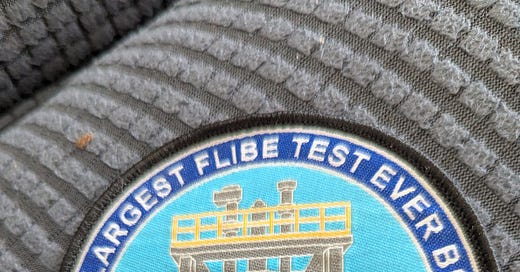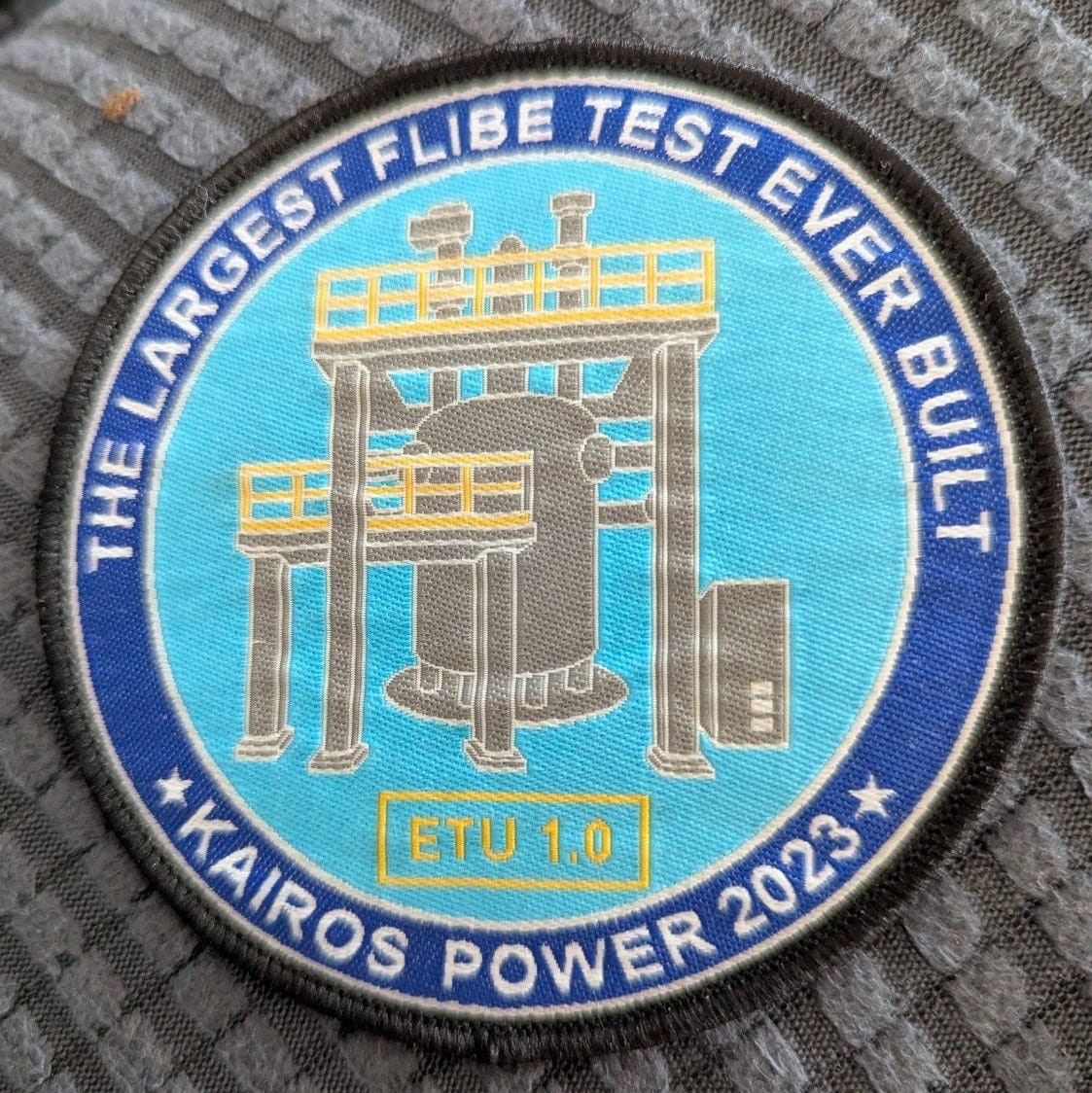Baseball!
Major league baseball’s opening day is March 27, but now that Oakland has lost its MLB team I’m thinking more about minor league baseball. When I looked up the hometown Ballers’ schedule I discovered some dandy Pioneer League team names, including the Grand Junction (Colorado) Jackalopes (from the name of a mythical portmanteau animal) and the Missoula PaddleHeads (a folksy term for a male moose). Then there are the Rocky Mountain Vibes, formed in 2019 and named in a contest whose finalists included “Colorado Springs Happy Campers,” “Colorado Springs Lamb Chops,” “Colorado Springs Punchy Pikas,” “Colorado Springs Throttle Jockeys,” and “Rocky Mountain Oysters.” (Click that last link if you don’t know what a Rocky Mountain oyster is.)
“Vibes” is fun, but Rocky Mountain Oysters would have been A++.

Chemicals!
Conventional nuclear reactors use water as a coolant, which is inefficient and potentially dangerous. An alternative approach involves a molten salt called flibe (rhymes with tribe), an acronym for fluoride lithium beryllium. The word, which is sometimes styled FLiBe, has been around since the early 1960s, when a small experimental nuclear reactor using flibe salt was built at the Oak Ridge National Laboratory. Flibe technology is being considered more seriously now by a couple of nuclear-power startups. One is Flibe Energy, in Huntsville, Alabama; another is Kairos Power, in Alameda, California. (Kairos: Greek for “the right time” or “opportunity.”)
Flibe sounds hilarious to me, like flubber, the magical “flying rubber” in The Absent-Minded Professor.1 But it’s not as funny-sounding as an acronym that would more accurately represent the chemical proportions: Beflif (beryllium fluoride + lithium fluoride).
Thanks to technical editor Brianne Hughes for introducing me to this weird and wonderful acronym!
And now let’s take a musical break to hear the great Tom Lehrer singing the periodic table to the tune of Gilbert and Sullivan’s “I Am the Very Model of a Modern Major-General.”
Early birthday wishes to Tom Lehrer, who will turn 97 on April 9!
Characters!
Novelist Mark Greaney, whose most recent book is Midnight Black, answered the New York Times Book Review’s question about how he names his characters (gift link):
My answer is absurd, but true. I go online and pull up the website of the national volleyball league in whatever nation my character is from. I then pick a couple teams at random, then find given names on one team and surnames on the other, making sure the names work well together and don’t sound too much like other characters in the same book. I use volleyball because it’s random; nobody knows volleyball players’ names!
Read my story for Medium about character-naming (gift link).
Backronyms!
I’ve written over the years about legislative backronyms (see this from 2017, for example), which have grown in popularity since the early 1980s, when the word backronym was coined.2 Here are a few that have cropped up recently:
MEME Act, introduced on February 27 by Rep. Sam Liccardo (D-CA). “The Modern Emoluments and Malfeasance Enforcement (MEME) Act would prohibit the president, vice president, members of Congress, senior executive branch officials and their spouses and dependent children from issuing, sponsoring or endorsing a security, future, commodity or digital asset.” Liccardo said the legislation would “prohibit the country’s top officials and their families — from Congress to the White House — from capitalizing on personal meme coins” such as the ones launched by Donald J. ($TRUMP) and Melania ($MELANIA) Trump.
GENIUS Act, introduced on February 4 by Sen. Tim Scott (R-SC) and co-sponsored by Sen. Kirsten Gillibrand (D-NY). The backronym stands for Guiding and Establishing National Innovation for U.S. Stablecoins. (Shouldn’t it be GENIUSS?) From American Prospect: “Gillibrand has worked for years to push industry-friendly crypto legislation through Congress, and she may have hit on a winning formula, with a critical mass of Democrats having received millions from crypto PACs and ready to collaborate with Republicans and the Trump White House.” Was someone on Capitol Hill thinking about a certain “very stable genius”?
F.U.R.R.I.E.S. If only Molly Ivins were still with us to comment on the Forbidding Unlawful Representation of Roleplaying In Education Act, introduced in the Texas legislature on March 13 by Stan Gerdes (R-Smithville). It would “prohibit any non-human behavior by a student, including presenting himself or herself, on days other than exempt days, as anything other than a human being.” Not only is it dumb legislation, it’s a bad backronym.
And one more thing!
Last week I wrote about Confessions of a Good Samaritan, the documentary from director Penny Lane about altruistic organ donation. I noticed in the credits that Lane’s production company is called Spinning Nancy, which naturally piqued my curiosity. I emailed a query to Lane without really expecting she’d write back. But she did! Here’s her reply:
The name came from a conversation with my business partner who is bilingual but grew up in Sweden, and sometimes stumbles reaching for the correct English idiom. In a production meeting, he was trying for “lazy Susan” and it just made us both laugh. We like to remember to laugh whenever possible!
Thanks, Penny Lane!
And it’s too generic to be a truly distinctive company name.
Definition: An acronym formed from an already existing phrase. A notoriously tortured example is the USA PATRIOT Act of 2001, which stands for “Uniting and Strengthening America by Providing Appropriate Tools Required to Intercept and Obstruct Terrorism.”





The backronym discussion reminded me of a time when I worked with some collaborating school systems, and we were developing some sort of work place skills training program — and some in the group came up with the acronym PFAST. I can’t remember what it stood for, but I told them “we can’t call this program Pee-fast.” “Oh, no,” they said, “the P is silent.” I still advised against it (with others) — and if memory serves me correctly, we won out.
By coincidence, I just ran across this in Lee Child's preface to a reprint of his first "Reacher" novel.
=================
At first he wasn’t called Jack Reacher. In fact, he wasn’t called anything at all. The part of writing that I find most difficult is coming up with character names. My books are heavily populated with stationery brands and other authors, because when I need to name someone I tend to look around my office helplessly until my eye alights on the front of a notebook or the spine of a book on my shelves. Once or twice I stared out my window until a neighbor walked past, or thought back to the name badge of the last clerk I saw in a store . . . all kinds of people get their names in my books, most of them unwittingly. But obviously the main character’s name is very important to get right. With luck it will appear in many books, and even be talked about in other contexts. I started writing with no clear idea of the name. The first book was written in the first person, which meant he didn’t need a name until someone else asked what it was, which didn’t happen for thirty or so manuscript pages. Then a police detective asked, “Name?” I put my pencil down and thought. The best I could come up with was Franklin, as I recall. But I wasn’t happy with it.
Then I went shopping. Part of the problem with not currently having a day job was, well, I didn’t have a day job, and my wife therefore assumed that after many years of solo struggle she now had help with chores. So she asked me to go to the supermarket with her, to carry stuff home. I’m a big guy; she’s a small woman. She was also a worried woman, although she was hiding it well. Our life savings were disappearing, and regular paychecks were merely distant memories. In the supermarket—and this is a common experience for tall men—a little old lady approached me and said, “You’re a nice tall gentleman, so would you reach that can for me?” My wife said to me, “If this writing thing doesn’t work out, you can always be a reacher in a supermarket.” I thought, great name!
[...]
His first name came from conclusion number two: Don’t do what the others are doing. At the time there was a miniature rash of characters with cute or complex first names. So I looked for the simplest and plainest name I could find. I chose Jack, and not as a diminutive for John, either. It’s just Jack. (One of my grandfathers was called Harry, which most people assumed was a diminutive for Henry, but it wasn’t. Harry was on his birth certificate.) In my third book, Tripwire, there’s a passage that starts: “Reacher had been named Jack by his father, who was a plain New Hampshire Yankee with an implacable horror of anything fancy.” I wanted to underpin Reacher’s blunt and straightforward manner with a blunt and straightforward name. I didn’t think the character would have worked with, say, MacNaughten Lawrence for a name. Still don’t. Even though the first name could have been abbreviated to “Mac” on nearly all occasions, the hidden truth on his official papers would have implied something that I didn’t want implied.
Child, Lee. Killing Floor (Jack Reacher, Book 1) (p. 8). Penguin Publishing Group. Kindle Edition.